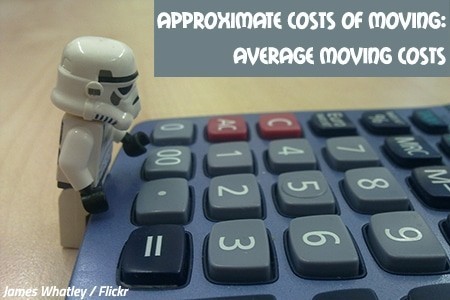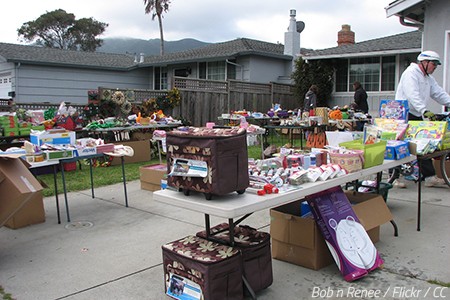The moment you learn that your residential move is only a matter of time is the exact moment when a myriad of questions will most likely flood your mind and make you genuinely worried about the preparation period ahead of you.
It can be really frustrating that regardless of how much time you have until moving day arrives – a few months, a few weeks, or a few days (!), you’re still going to have to answer a number of essential questions to complete the trouble-free move you want.
One of these fundamental questions is, of course, strictly related to the approximate costs of moving house: what are the average costs of moving house?
Whether you’re moving out of a 1-, 2-, or 3-bedroom apartment, or you’re leaving a 1-, 2-, 3- or 4-bedroom house, you need to know how much you’re expected to pay on average either by hiring professional moving services or by organizing and executing the move by yourself (self-moving).
Also, the move distance between the two homes – short distance (local) or long distance (cross country) will affect greatly how deep you’ll be forced to dig into your pockets, desperately looking for more dollar bills.
So, what are the average moving costs?
Why do average moving costs matter?
The truth is, you may not get the right answers to all the pressing issues at the beginning of your preparations, but you must know the price of your incoming move in advance so that:
you set up your moving budget the way you’re supposed to;
you prevent any unpleasant cost-related surprises at the end of the relocation;
you reduce the moving stress by knowing that you’re financially ready to handle the local or cross-country move ahead of you.
Thus said, remember that the only way to get an accurate estimate of the costs of your move is to have your chosen moving company perform an expert visual inspection of your home and give you a precise price quote.
Nevertheless, understanding various real-life moving scenarios and their approximate costs will help you gain a deeper knowledge of what relocation options you actually have and what to expect from your mover’s estimate.
The approximate costs of moving you’ll find in this article should serve as a useful preview of what your actual moving quote will look like. In reality, these approximated values can only be used as guidance because the real-life moving company rates will be dependent on the region where you live, your town or city, the moving company itself, and the specifics of your own local or long-distance move.
Moving company costs on average
In most cases, moving house with the help of a professional moving company is the preferred way to approach the numerous challenges of that significant period in one’s life. As a rule of thumb, turning to the pros for assistance will eliminate plenty of stressful guesswork and will make the entire house relocation much faster and easier.
The only drawback is that you will have to pay for their moving services but that often proves to be a disadvantage in disguise the moment you calculate the potential risk and dangers of self-moving, add up the lost time in doing it all by yourself, and include the possible irreparable damage to your nervous system.
So, what are the average full-service moving costs?
Average moving costs for local moves
Myth #7: Hiring professional movers is the most expensive way to move house.
Local moves are moves that never leave the state of origin and the destination point stays within approximately 100 miles.
And if you do decide to hire local movers to help you out, then the first thing you should know is that local moving companies charge by the hour.
What that means for you is that it’s the time spent on performing the move that matters the most rather than the individual move-related tasks such as packing, loading, transporting, and so on.
And as time defines the price, the factors that affect how much time your local move will last are:
the size of your house or apartment (the bigger it is, the more items there will be inside it);
the number of additional services to be performed (for example, packing your home by yourself or having it packed by the pros?);
the number of packers and movers working on your local relocation;
the exact distance to your new address.
Taking into account that the average moving cost per hour is roughly $60 per mover per hour,
moving out of a studio apartment or a 1-bedroom apartment should take 2 workers about 4 hours to complete the move, which makes approximately $480 without additional fees and charges;
getting out of a 2-bedroom apartment or house should be all about having 3 local movers working for about 6 hours and complete your move for roughly $1,080 excluding extra charges;
moving away from a 3-bedroom house should take 4 workers about 7 hours to get the job done, which in turn should cost you approximately $1,680 with no extra fees included in the price;
moving out of a 4-bedroom house should take 4 local movers about 9 hours to complete the move, costing you approximately $2,160 without additional fees and charges.
Home Size
Number of Local Movers
Number of Hours
Average Moving Cost
Studio / 1-bedroom
2
4
$480
2-bedroom
3
6
$1,080
3-bedroom
4
7
$1,680
4-bedroom
4
8
$2,160
It’s important to keep in mind that unforeseen factors can and probably will influence the approximate costs of moving locally one way or the other. That is, your local move will become cheaper or more expensive depending on the concrete circumstances that surround it.
Additional services will cost you more;
Packing services are charged on an hourly basis as well /$60 per hour/ and usually include the price of the packing materials;
Each additional packer or mover will cost you approximately another $60 per hour;
Expect to be charged a travel fee as well – the time it takes the moving crew to reach your home;
Purchasing moving insurance will add up to the approximate cost of moving house but it can be an excellent decision to protect your valuable possessions against accidental damage.
20 Simple and Easy Ways to Reduce Moving Costs
Average moving costs for cross-country moves
Moving across the country is a risky affair that’s best left to the pros. Ask movers for price calculation, and then take advantage of cost reduction techniques.
Once your move is bound to cross state lines or exceed the 100-mile radius, it’s already classified as an interstate move and the approximate costs of moving across the country will be calculated differently than short-distance relocation cases.
In practice, cross-country moves are much harder to be generalized as far as preliminary expenses are concerned because of three major price formation criteria that work at the same time: 1) move distance, 2) shipment weight, and 3) additional services.
The cost to move furniture, for example, will be calculated based on the weight, size, and nature of your home furniture. Expect to pay more if you need experienced packers and movers to handle bulky, super heavy, or antique furniture pieces.
The cost of moving furniture will also be dependent on the specific conditions in your home such as narrow corridors and staircases, smaller doorways, or unavailability of an elevator. For instance, if some of the furniture pieces have to be disassembled, the furniture moving costs will be respectively higher.
Move distance. The move distance between the two homes remains a constant value so focus on the next two factors.
Shipment weight. How much your shipment weighs will play a great role in determining the final relocation bill. Make an effort to reduce that weight by getting rid of any household items you don’t really plan to use in the future.
Extra services. Choose only the moving services you do need. If you can, pack up some or all of your items by yourself to save big.
The approximate cost of moving cross country, without any extra services and additional charges, is as follows:
Studio / 1-bedroom apartment. The cost of moving out from a studio or a 1-bedroom apartment to a new home located 1,000 miles away should cost you approximately $1,500 – $3,200.
2-bedroom apartment or house. The average moving costs for a 2-bedroom apartment or house are roughly $3,500 – $5,200 for a move distance of 1,000 miles.
3-bedroom apartment or house. The average moving costs for a 3-bedroom house or apartment are approximately $6,300 – $7,800 for a move distance of 1,000 miles.
4-bedroom house. The approximate moving costs for a 4-bedroom house are roughly $8,000+ for a move distance of 1,000 miles.
Home Size
Move Distance
Average Moving Cost
Studio / 1-bedroom
1,000 miles
$1,500 – $3,200
2-bedroom
1,000 miles
$3,500 – $5,200
3-bedroom
1,000 miles
$6,300 – $7,800
4-bedroom
1,000 miles
$8,000 +
Please keep in mind that the above-mentioned average moving costs per mile and average moving costs per pound can only be used as reference values due to the case-by-case nature of residential moving. As mentioned above, approximate moving company costs can still be useful for forming a general idea of just how strong a hit your budget will take.
For much more accurate price estimation, get free quotes by filling out this Moving Cost Calculator
Average moving costs of self-moves
Some people are quick to conclude that moving on your own is always a cheaper way to move house than hiring a professional moving company to take care of the toughest aspects.
While under specific circumstances that can be true, one should look at the bigger picture and consider a number of important factors that often end up being taken out of context.
Before you even think about performing a self-move, make sure you answer YES to all of these prerequisites to avoid a disastrous DIY move with loads of lost time and money.
You’re moving short distance or within the same town or city;
You have a few good friends you can rely on come Moving day;
You have moved house at least once before;
You have confidence that you can organize the entire move by yourself.
And if you’ve got 4 positive answers, then it’s time to take a closer look at both the obvious self-moving costs and the hidden costs of moving on your own.
Are you keeping tabs on your self-moving budget?
Average moving truck rental cost. The cost of renting a moving truck can vary greatly depending on the truck rental company, the size of the moving van, the distance to be traveled, the number of days you need the vehicle for, the time of the year, and more. On average, a 14’’ moving truck (2-bedroom home) can cost around $20-$30 for 8 hours + $0.70-$1.10 per mile. A 24’’ rental truck (3-4 bedroom home) can cost roughly around $40-$70 per day + $0.70-$1.10 per mile. Of course, it’s best to contact a reputable truck rental company and request an accurate quote as each move is different. Also, besides the truck rental insurance (approximately $150), beware of additional fees and surcharges (additional mileage fees, cleaning fee, fuel surcharge, tolls, etc.) that could really put a damper on your self-move initiative.
Moving equipment. You will most likely need to rent a few pieces of moving equipment (a moving dolly, furniture blankets, furniture pads, and so on) if you insist on organizing and executing a safe move.
Packing materials. Most of your cardboard boxes you can find for free, or almost for free, from local businesses and friends who have recently moved, but bubble wrap and clean packing paper you do need to purchase, especially if you own too many delicate and easily breakable items. Don’t forget quality tape and a set of color markers as well.
Hidden DIY moving costs. Finally, it’s time to say a few words about the so-called hidden DIY costs of moving by yourself that could be the turning point in your decision to hire a top-rated mover to take care of your move. Such approximate costs of moving on your own include but are not limited to moving insurance for your expensive items, road taxes, as well as food and lodging expenses while on the road. Should personal injuries or property damage occur due to move-related inexperience or a concentration of bad luck, then the average moving cost could easily go through the roof.
Sometimes you can hear people say that money is not everything, and they should have a good reason to believe so. Still, when it comes to the fairly complicated process of moving house, it seems like money will dictate the way your local or cross-country move unfolds.
And now that you are familiar with the approximate moving costs, we believe you will make the informed decision that will change your household move for the better.
What to Do: Hire Movers or Move by Yourself?
The post Approximate Costs of Moving: Average Moving Costs appeared first on The Moving Blog.







